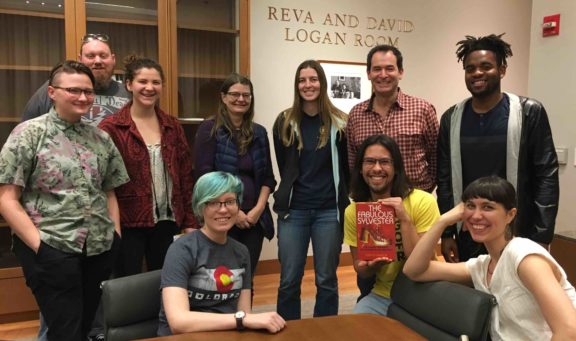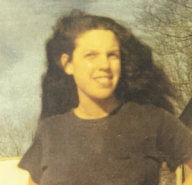About the Site

The students of American Studies H110 (2017) with sociologist Joshua Gamson, clockwise from left: Kashmir Kravitz, Matthew Willett, Madeline Appel, Linda Barghi, Kristen Wilson, Joshua Gamson, Anthony Gilmore, Tessa Rissacher, Max Lopez, Madeleine Calvi
This website is a collective project, one which emerged originally from an honors undergraduate seminar in American Studies at UC-Berkeley — “The Bay Area in the Seventies,” taught by Scott Saul in the spring of 2017. The eleven students in that seminar shaped their own research projects, burrowing into archives official and unofficial so as to recover the stories missing from or hidden within standard accounts of Berkeley’s history. The seminar was then repeated in the spring of 2018 with nine more students.
In the spring of 2020 the course was expanded, under the aegis of Cal’s Global Urban Humanities initiative, into a 16-person seminar co-taught by Saul and the School of Architecture’s Greg Castillo, with support from Natalie Koski-Karell. In this version, the course took on projects focused on Oakland’s history as well as Berkeley’s. Because the COVID-19 pandemic meant that brick-and-mortar archives were shuttered, this team of students had to look beyond the primary-source collections housed in traditional archives. Their research projects, as a result, tended to rely more on digital archives and on oral history (or what, alternatively, might be called the kindness of strangers).
This expansive, curated archive—with 700 documents organized across sixteen main projects, delving into the East Bay’s political and cultural revolutions and their aftershocks—is the result.
Beyond the 1960s: A History of Berkeley in the 1970s
This phrase “Berkeley in the Sixties” conjures a host of associations, many of them revolving around student activists in the Free Speech and antiwar movements. The phrase “Berkeley in the SEVENTIES” is less resonant, but the city in that decade was at the center of many large-scale transformations that were just as consequential in American culture and politics. 1970s Berkeley served as ground zero for the Black Arts and Black Power movements, Women’s Liberation, the movement for ethnic studies, the ecology movement, the gay liberation movement, the Disability Rights Movement, and the free school movement. At the same time, the city was also the scene of countless smaller, more personal attempts to remake society from the ground up.

The students of American Studies H110 (2018) with Prof. Scott Saul: (kneeling from left) Sarah Kersting, Scott Saul, Sarah Sexton, Alexandra Von Klan, Brandon Redmon, Roxane Beygi, Seamus Kirkpatrick; (standing) Dylan Burgoon, Abigail Sotelo
On this website we tell this story: of the rare city in the United States where the transformations of the 1960s continued to gain momentum in the 1970s. It’s not a simple tale. An openness to cultural and political experimentation; a hunger for personal authenticity, for a life lived fully, with oppressive social masks stripped off; and a commitment to redress longstanding inequities in American life: these three impulses pulled Berkeley in a number of directions in this period, producing dramatic results and often equally dramatic conflicts. The ideals of the 1960s were tested on the streets of Berkeley in the 1970s.
Both Sides Now: Towards a More Capacious Archive of Voices
A quick story to illustrate, in miniature, what this digital archive aspires to do. In the summer of 1970 a policeman raided a South Berkeley house where runaway youth had squatted. He found a letter that a young female runaway had written but never mailed to her mother in West Virginia. “I’m healthy and happy here,” the young woman enthused in her letter, “there is so much to do here….Everything is free—health clinic, food, clothes—so it’s quite easy to survive.”
For the decidedly non-radical Berkeley Gazette, the letter was Exhibit A for why Berkeley police needed to clamp down on runaways: these young people were a drain on public funds and were abusing the city’s hospitality.

Jodi Mitchell, a few years after she arrived in Berkeley as a self-described “teenage runaway”
But what of the young woman, Jodi Mitchell, who wrote the letter? If we look at her diary from a few months after the raid, we note that this same woman contemplated suicide and struggled to find a place she could call home; the self she projected in her letter home was not her only self. And if we read Mitchell’s reflections from forty years later, we see other layers to the story: how sleeping at a supposedly free “crash pad,” for instance,” often came with expectations about one’s sexual availability.
This rich dialogue between sources—a dialogue which dramatizes a range of perspectives, often from outside mainstream channels—is what “The Berkeley Revolution” aims to offer. The site allows you to delve into the primary materials we’ve curated and, we hope, to get a vivid sense of the lives out of which they emerge. There are a great number of “Berkeley revolutions” within “The Berkeley Revolution”; many, if not most, were incomplete or abbreviated, but their effects were far-reaching nonetheless.
Acknowledgments
The building of this website would not have been possible without the advice, cooperation, and generosity of many individuals and institutions. We would like to thank the following: Jim Baumohl, the Berkeley Public Library, William Bottini, Cathy Cade, Roy Chan, Alex Cherian, the City of Berkeley, Fred Collingnon, Matt Delmont, Harvey Dong, Shanna Farrell, P. Gabrielle Foreman, Rodney Gillead, the GLBT Historical Society, Stefano Gonzalez, Jeremy Jachym, Sine Hwang Jensen at UC Berkeley’s Comparative Ethnic Studies Library, Michael J. Kramer, Alicia Bay Laurel, Debbie Lempke, Suzanne Lo, Scott Paul McGinnis, Martin Meeker, Susan Moffat, Doris Jo Moskowitz, Liam O’Donoghue, Daniel Perlstein, Peter Richardson, the San Francisco Public Library, William Sato, Sue Schweik, Suzanne Shanbaum, KPIX’s Tom Spitz, Susan Stryker, UC Berkeley’s Bancroft Library, UC Berkeley’s Ethnic Studies Library, Nancy Vogl, Tahira Warner with the Berkeley Mental Health Program, Mary Williams, Akaya Windwood, Eddie Yuen, and Judy Yung.
We extend special thanks to Susan Brooks, Charles Brown, Nacio Jan Brown, Jim Campe, Liane Chu, Ms. Bob Davis, Tom Dalzell, Kathy Evans and the Ecology Center, Leslie Ewing and Ann Mitchell of Pacific Center, Lenn Keller and her Bay Area Lesbian Archives project, Ray Lifchez, Rachel Marinos, Jodi Mitchell, Ed Perlstein, Odette Pollar, Electra Price, and Jeanne Rose, whose contributions were crucial to the larger project. Lastly, we would like to thank the Digital Humanities at Berkeley, which provided funding for the site’s development, and UC Berkeley’s Global Urban Humanities program, which supported the site’s expansion.
Site Credits
Editor-publisher (2017- ): Scott Saul
Co-editor (2020): Greg Castillo
Writer-curators, “The Black Panthers’ Education Revolution”: Hannah Bahls and Dewi Zarni
Writer-curator, “The Berkeley Women’s Music Collective”: Lily Ramus
Writer-curator, “The Flatlands‘ War on Poverty”: Will Seaver
Writer-curator, “The Asian Community Library”: Kelly Wong
Writer-curator, “The Integral Urban House”: Wesley Tam
Videographer-curator, “The Countercultural Kitchen”: Emily Lempko
Writer-curator, “A Place for Every Body”: Alexandra Von Klan
Writer-curators, “The Secret History of Recycling”: Brandon Redmon and Abigail Sotelo
Writer-curators, “Pacific Center”: Dylan Burgoon and Sarah Sexton
Writer-curator, “Threads of Rebellion”: Sarah Kersting
Writer-curator, “Citizens vs. Developers”: Seamus Kirkpatrick
Writer-curators, “Rainbow Sign,” “Mary Ann Pollar”: Max Lopez and Tessa Rissacher
Writer-curators, “The Women and Girls of Telegraph Avenue”: Madeline Appel and Sally Littlefield
Writer-curators, “Berkeley’s Public Schools”: Linda Barghi, Scott Saul, and Kristen Wilson
Writer-curators, “The Third World Liberation Front”: Anthony Gilmore and Kai Nham
Writer-curator, “The Keystone”: Matthew Willett
Writer-curators, “Transgender Berkeley”: Madeleine Calvi and Kashmir Kravitz
Website developer and designer: Kristin Jones
Graphic design contributor: Kai Nham
Icons made by Google from www.flaticon.com licensed by CC 3.0 BY.
Banner image from Romare Bearden, Berkeley: The City and Its People (1973), collage of various papers with paint, ink, and graphite on seven fiberboard panels, City of Berkeley, California, Public Art Collection.
Scott Saul is Professor of English at UC-Berkeley and author of Becoming Richard Pryor (HarperCollins, 2014), for which he created a digital companion, “Richard Pryor’s Peoria,” similar in spirit to “The Berkeley Revolution”.
Greg Castillo is Professor of Architecture at UC-Berkeley. He is the author of Cold War on the Home Front: The Soft Power of Midcentury Design (University of Minnesota, 2010) as well as the guest curator of the exhibition Hippie Modernism: The Struggle for Utopia (Berkeley Art Museum and Pacific Film Archive, 2015) and co-editor of Design Radicals: Spaces of Bay Area Counterculture (University of Minnesota, forthcoming).
Questions or comments? Please write to Scott Saul at ssaul@berkeley.edu. He welcomes your feedback.
We’ve made every effort on this non-commercial, educational website to abide by protocols of ‘fair use’. Please write to ssaul@berkeley.edu if you have concerns about the materials made available on the site.